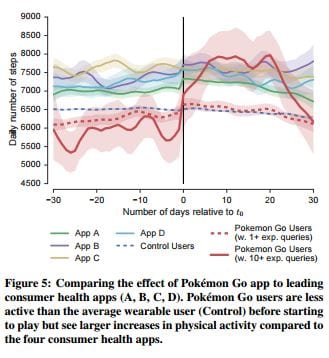We all basically assumed that Pokémon Go was making us healthier, but now there’s a study out there that kind of proves it.
I say “kind of” because even the folks at Microsoft and Stanford, who conducted the study for Microsoft Research, recognized the limitations of their methods.
They essentially tracked user activity through July and August.
But they found their participants by tracking people who searched for Pokémon GO content…
On Bing:

Photo Credit: Justin O
Someone on the research team then decided which of those searches suggested that the person was actually playing the game, based on the content they were searching for.
About 1,420 or 5.6% of those searchers were deemed Poké-GO players.
That’s actually pretty close to the estimated 5.92% of people in the US reported in mid-July:

Photo Credit: Similar Web
But, to be a participant in the study, you also had to be a daily user of the Microsoft Band:

Photo Credit: Microsoft
So, even though the ~1,400 users matched up pretty close to real-world numbers, they aren’t exactly a random sample:

Photo Credit: Adam Frucci/Gizmodo
Also: less than half of those users (792) had enough data for the study.
And since none of these Microsoft fans knew they were being studied, you might even be one of the participants.

Photo Credit: 20th Century Fox
Of course, unknowing participation and odd selection methods don’t mean that the people studied didn’t do some serious walking.
In fact, the average Pokémon GO player increased their activity by about 1,473 steps per day – a 25% increase.
If you apply that to all 25 million active players in the US at the time, then Pokémon GO is responsible for 144 billion extra steps.
That’s 2,724 trips around the Earth:

Photo Credit: Giphy
Or 143 round-trips to the moon:

Photo Credit: CAMERA PRESS/David Farrell
Pokémon GO players actually began less active compared to the control group and other “health app” users, but, eventually, they outperformed the others:

Photo Credit: Microsoft Research
When you consider that almost 65% of the participants in the study were either overweight or obese, those numbers are even more impressive.

Photo Credit: Microsoft Research
If the average participant continued this increased level of activity throughout their lifetime, they’d gain 41.4 days of life expectancy.
That’s a total of 2.825 million years, if you add all 25 million US users.






